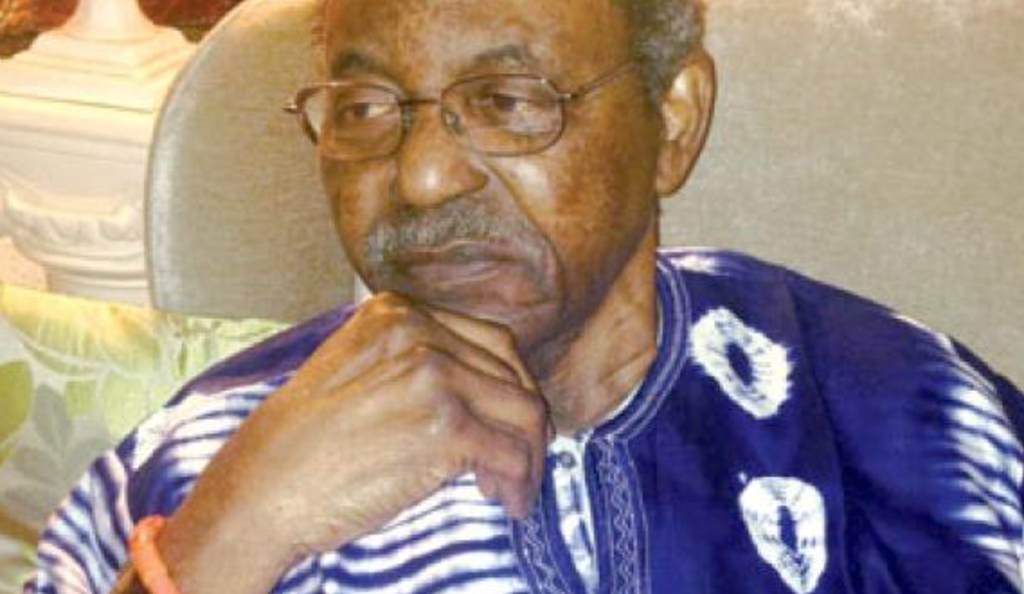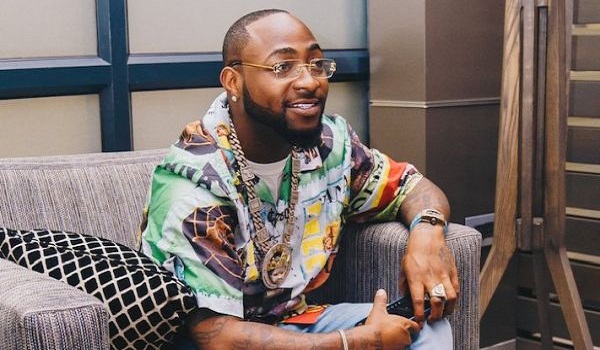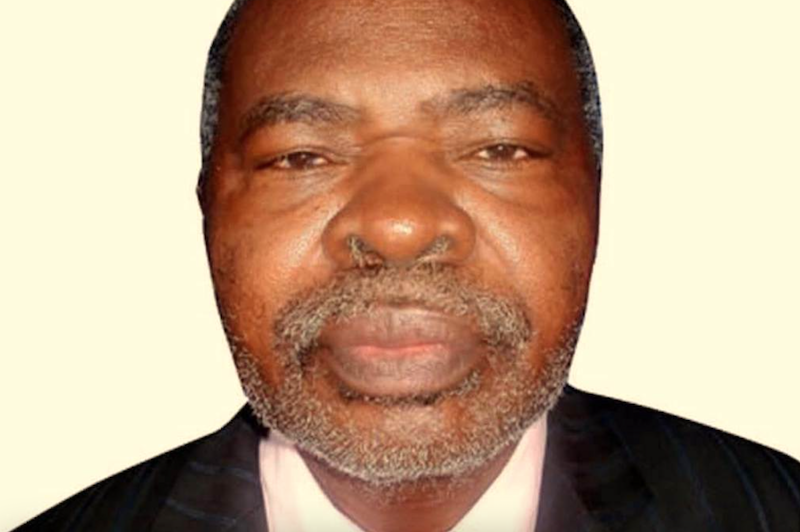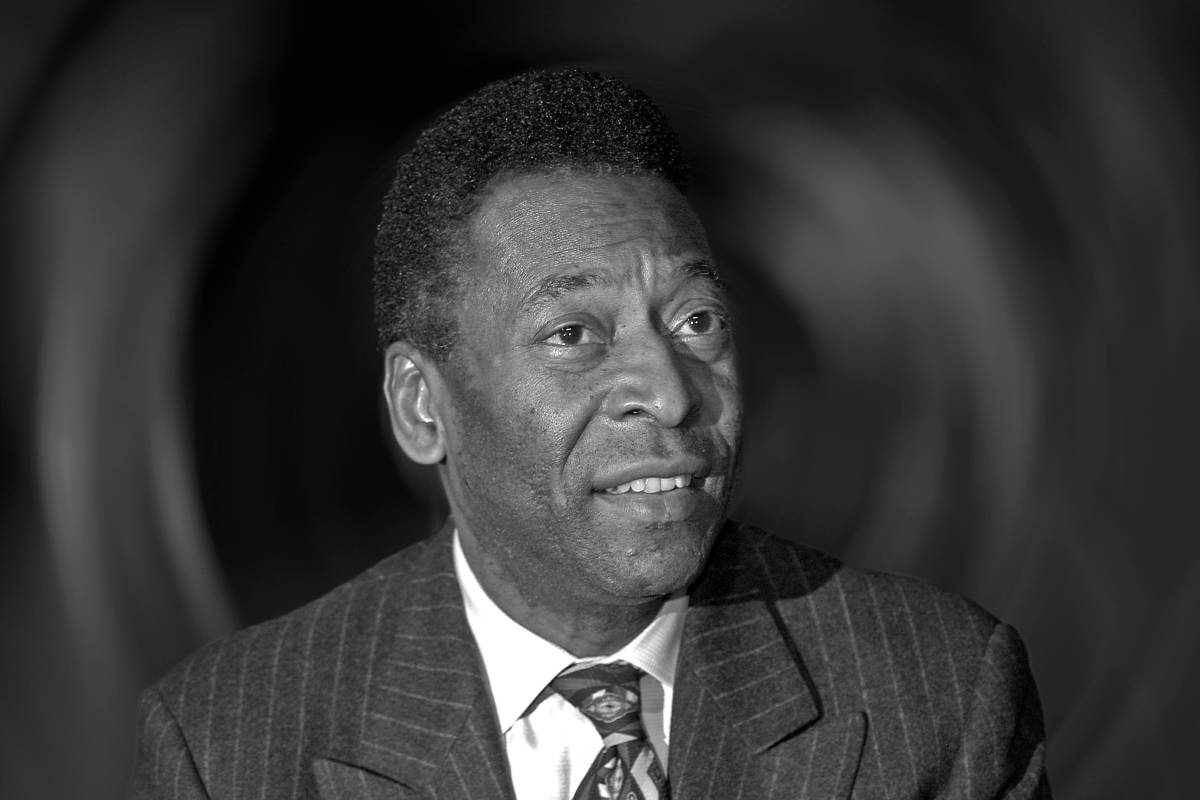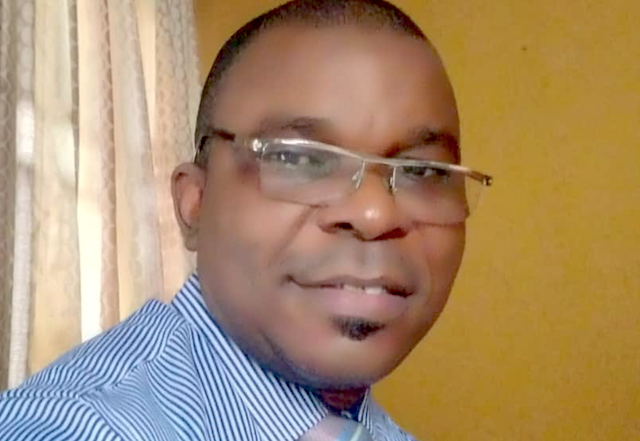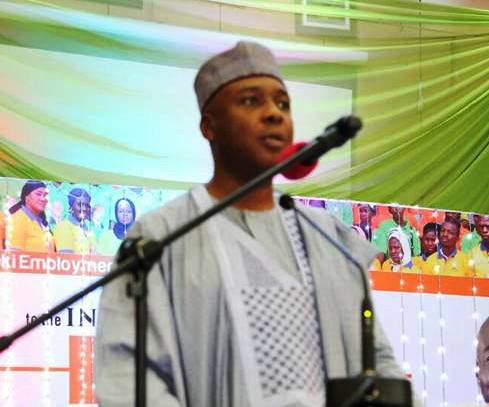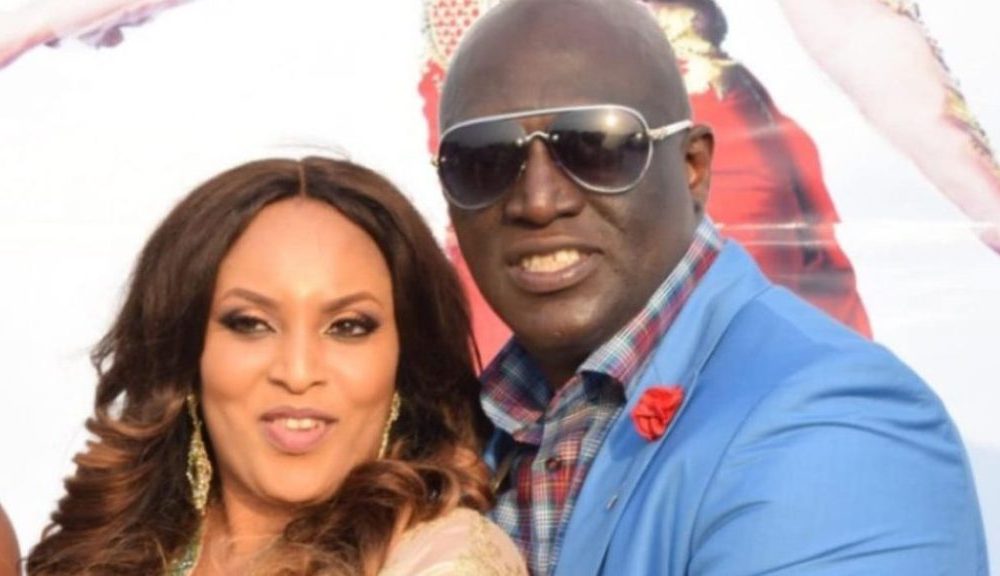By Abdu Rafiu
A leader and a giant in the world of journalism has discarded his earthly cloak and departed earthly life. He is Peter Enahoro more known as Peter Pan. The news of his exit has reverberated around the world. His was a distinguished career in journalism.
He joined the Daily Times in 1955, a year after leaving school, Government College, Ughelli, armed with love of reading and mastery of English language. And fearlessness. He rose rapidly and became the editor of Sunday Times in 1958 at 23, the editor of ubiquitous Daily Times in 1962 in succession to Alhaji Babatunde Jose at the age of 27. Driven by the melancholic temperament inherent in all youths at a particular period in their development, he saw the world upside down and resolved and, indeed, strove to straighten it, to prove to the world that, in the words of Playwright Edward George –Lytton, “the pen is mightier than the sword.” It is the age of idealism; it is the age of dreams. It is the period all young men and young girls can easily tell right from wrong. It is the age a young girl looks at her mother full in the face and says, “Mom, that was your time, not mine; so forget it.” As for the young man, he is set to take the next available flight to fetch the moon.
By the age of 30 still smarting under the grip of his temperament, Peter Enahoro had become the Editor-in-Chief of the Daily Times. Now, he was poised to do battle with evil in our land. The crisis that began in the Western Region in 1962 had festered and was reaching a crescendo. His column, Peter Pan which he ran twice a week, became fiercer, hard-hitting and unsparing. He was in the right place, the Daily Times, the home of independent journalism, restrained only by the law of the land and law of decency. The Daily Times was the biggest and flourishing newspaper empire in Africa, south of the Sahara. He also had the management who thrust their chests out, standing as an unfailing bulwark between governments, indeed between the jackboots of the military and the journalists in their brave world–up to the time of Dr. Patrick Dele Cole.
I recall an incident when the Federal Authorities got wind of a report in preparation in the Sunday Times with which they had issues and asked Tunji Oseni, the editor, to pull it out of his paper. It was a report on the then Nigeria Airways. Oseni rejected the directive saying his line of reporting was not to the government, but to his managing director. Dr. Cole was reached and he stood by his editor. The story led the paper the following morning.
Anastasius Okotako Enahoro, the father of the Enahoros had told his children that they should go into the world and unfold their talents and abilities. An educationist, he had said to them that whatever they found themselves doing, they must do it well. He was wont to say that what was worth doing at all was worth doing well. As Peter was to say, this charge by his father was an energy tonic for him, and ringing every time in his ears. Three of the children were into journalism– two, Anthony and Peter into print while Mike Enahoro settled for broadcast journalism. Edward, the immediate younger brother of Anthony Enahoro, was a diplomat, while Henry, Peter’s own immediate younger sibling was an educationist, taking after their father. One would have thought that because Anthony Enahoro had made a huge success of his career in journalism, his younger brother would live under his shadows. It was not the case. Peter Enahoro resolved to find his own niche spectacularly ending, arguably, a more towering figure in journalism.
Anthony Enahoro was editor of Southern Nigerian Defender in Ibadan at the age of 21, setting the record as the youngest editor ever in Nigeria. He was editor of The Comet in Kano and editor of West African Pilot in Lagos, all Dr. Nnamdi Azikiwe’s newspapers. Indeed, he was also Editor-in-Chief of Morning Star in Lagos. He used the papers to battle the colonialists in the struggle for independence. He was in and out of jail for his writings and his convictions. When he switched into politics, and what he did not wholly achieve much as he packed heat on the colonialists in his writings, he was later to table on the political platform of the Action Group led by Obafemi Awolowo. He moved the motion in Parliament for Nigeria’s independence in 1953.
Peter carved out his own path. He cut his teeth in the media in 1954 as an assistant publicity officer in the Department of Information that is today called Federal Ministry of Information. It was his encounter with Dr. Azikiwe, the then Premier of Eastern Region that proved to all present at Zik’s Press conference that he belonged elsewhere other than the ministry where rules of engagement place certain restrictions on civil servants. His boldness and drive putting civil service ethics aside to ask Dr. Azikiwe an inconvenient question impressed the celebrated columnist, Abiodun Aloba who wrote under the pen-name Ebenezer Williams. Aloba was then also editor of the Sunday Times. He saw in Peter Enahoro more of a pressman than a press officer. Abiodun Aloba immediately offered him job in the Daily Times. Peter Enahoro resigned from the ministry and joined the Daily Times as a sub-editor in 1955 at the age of 20. A man with a keen sense of fairness, he resigned in 1957 from the Daily Times in solidarity with workers who were fired following a trade dispute in the company. He said he should have been considered a ring leader as well and sacked. He took up job as Assistant District Manager at Rediffusion Services at Ibadan. He was, however, prevailed upon to return to the Daily Times by the Editorial Adviser of the paper, Mr. Jeffrey Taylor and Alhaji Jose, the editor.
He got back to the Daily Times and was appointed Acting Features Editor, a position that provided him opportunity to sharpen his writing skills, for at the Daily Times, the Features Editor was the Chief Leader Writer, that is chief editorial writer with Alhaji Jose as editor in whose office issues deserving of editorial comments were discussed and under his chairmanship and direction. The editor had the last word and if he liked he could write the editorial himself. This was the practice until the coming of Dr. Patrick Dele Cole who established an Editorial Board to replace the old system which saddled the Features Department with writing of editorials, what has become the practice in practically all newspapers in this country. Dr. Stanley Macebuh was the first chairman and had as members, the Features Editor Dr. Doyin Abiola, (Nee Aboaba); Levi Okoroafor, Olu Akaraogun, Sam Oni and Dele Giwa, the last two coming from the United States.
Peter Enahoro did not stay more than two months when in 1958 he was redeployed as Acting Editor of Sunday Times to deputize for Tonye Willie-Harry, the editor who was away on a course. No sooner Peter Enahoro got into the editorial suite than he increased the circulation of the paper significantly. It was there he started his column writing, first, as George Sharp which instantly gathered a huge following. Because the newspaper was a business, the management had no hesitation, indeed wasted no time in confirming him as the substantive editor. A reward for exceptional performance that lay in wait for Segun Osoba, too, when he was sent to Lagos Weekend as Acting Editor to hold forte for the substantive editor who was away on leave. Within two weeks of his assumption of office the circulation of the paper doubled and it rose rapidly even more before the return of the editor. Osoba was simply asked to carry on. He was confirmed as substantive editor.
Before Peter Enahoro was kicked upstairs to become editor of the Daily Times, the organization’s flagship, at the age of 27, he had started his iconic column, Peter Pan, for which he was renowned in enlightened circles all over Africa. He took over from Alhaji Babatunde Jose as editor in 1962. That was the year crisis began in the Western Region with the leaders of Action Group charged with treasonable felony reaching a crescendo not just with the jailing of Chief Awolowo, Chief Enahoro, Lateef Jakande, LKJ just to name a few.
The Daily Times had the tradition of featuring great columnists, with the Sunday boasting of most of them starting from Ebenezer Williams; Peter Pan; Allah-De; Sad Sam and Gbolabo Ogunsanwo. In later year brandished Gbolabo Ogunsanwo before readers’ gaze; Haroun Adamu and Dr. Olu Onagoruwa. In the Daily there was the additional column, “Thinking with you”, by Dr. Tai Solarin, a non-conformist educationist. When the Sunday newspaper was conceived by Mr. Percy Roberts, the Daily Times General Manager/Chief Executive at the time, Cecil King who was Chairman was not keen on having a Sunday edition of the Daily Times. He acceded after much pressure by Percy Roberts on the unstated understanding that the paper was going to be not more than a light-hearted, mass appeal Sunday Pictorial. Such was the situation that when the paper was to take off, Percy Roberts did not give his editor, Theophilus Awobokun, the first editor any brief. He was to be content reading Percy Roberts’ lips. And that was exactly Awobokun did: The newspaper was to do interpretative reporting, story behind the story and serious features. Unknown to him he had played into the hands of his editors who were roaring to go—to give a damn good Sunday newspaper that was to combine mass appeal with doses of seriousness.
The editors gave the Sunday newspaper character with each of them stamping his image on the paper. First assignment was to drive the colonialists away. So, when the national Independence came on October 1, 1960, Ebenezer Williams, the second editor wrote to welcome the Independence in his column which he captioned “Be Happy”: That we go into Independence, in spite of everything, unafraid …The truth, of course, is that benevolent foreign rule can never be as good as the worst form of self-government. Man is ordained to look after himself.” The resolve to hold the Nigerian politician accountable came next. Let’s listen to Sad Sam:
‘Monkey Dey Work, Baboon Dey Eat’ (May 6, 1962)
“M.P.s who won’t sit in Parliament make me angry. One thousand pounds a year we pay them to serve us earnestly for fewer than 90 days a year. So they come to Lagos for a session in fine, fine cars and live in fine, fine flats at Victoria Beach.
But in the day time, some go about their business—outside the House. And for the most time, the House cannot form a quorum—like during the last Budget Session. At night, some have good times with the butterflies that abound.
‘Monkey dey work, baboon dey eat’. These politicians promise you all God’s Kingdom when they seek your vote; elect them and they let you down. Their good intentions in practice are at a discount because they are professionals—only amateur politicians are consistent. But beware of the amateurs.”
And Allah-De: “Akinjide my chum.” It was a piece in which he lambasted Chief Richards Akinjide for always defending what he thought was wrong. According to Allah-De, even when all could see that the Western Region was on fire and in chaos and collapsing, Akinjide said all was all right. Years later into military administration that came in 1966, Sad Sam wrote: “Who says Nigeria is in need of being saved—from the politicians or from soldiers?” At the time there were already grumblings that soldiers merely exchanged batons with politicians. There was no difference in public morality!
That was the environment the powerful editors of the Daily Times functioned. They also had free hands. With the combination of Peter Pan, Allah-De (Alade Odunewu) and Off-Beat Sam (Sam Amuka) in Spear Magazine and later Sad Sam in the Sunday Times, the Daily Times became a formidable institution, indeed. Predictably, the company incurred the wrath of the powerful and the influential. The management itself wrinkled its face occasionally and bit its lips but asked the editors to carry on. The powerful would not leave the management alone. Peter Pan in reaction tried to move away from the characteristic hard hitting of the powerful by George Sharp in view of the occasional discomfiture to management. He thought he could mellow a little by moving away from political commentaries and veer into socials, talk about women.
He wrote on one occasion: “I keep meeting them –the women of today. Sophisticated, elegant and just right (proportion-wise) here and there. They starve themselves mercilessly to keep their statistics on close link with the latest wonder to step into Hollywood. They carry a luggage of powder and pencils around for use at the slightest provocation…” It was around this period he wrote about the television divas of the era, Anike-Agbaje Williams, the first face on Television in Africa, and Julie Coker, both at work in Ibadan. The switch to socials did not endure. Peter Pan was back in the garb of George Sharp and even fiercer, when he became editor of the leading journal, Daily Times, but not until he had raised the circulation of the Sunday Times to 148, 986 copies, sometimes 150,000. Every issue of the Sunday paper was compelling. The management wrote proudly that if four persons read one copy as experts believed was the case, it meant more than 600,000 people “—over half a million—read the Sunday Times weekly.” As sales rose, so did the external pressure on the management to reassign Peter Pan. By 1962, instead of redeploying him, he was appointed the editor of the mother paper in succession to Alhaji Jose who became Managing Director.
The indefatigable editor Peter Enahoro wrote his column twice a week. As the hostilities against the newspaper would not abate–the Daily Times had been banned in 1964 together with the Nigerian Tribune in the Western Region by the government of Chief S. L. Akintola–Peter Pan had to step down as editor. He was made Group Editorial Adviser in 1965 and subsequently the Editor-in-Chief in 1966, both positions he saw as promotion to executive joblessness. The developments were largely as a result of the blackmail that because there was substantial foreign interest in the company (International Publishing Company’ publishers of Daily Mirror in London) the Daily Times was an instrument of the colonialists still keen on controlling the affairs of Nigeria. It was even more so that Cecil King, the Chairman of Daily Mirror and Daily Times never failed to commend Peter Pan for his work.
Nevertheless Peter Pan continued with the writing of his column, trenchant as ever. This gave him fulfillment. The position allowed him to travel within the country regularly. His proposed appointment as Editorial Director was thwarted by the military coup of 15 January, 1966 what he foresaw and against which he warned the politicians. He wrote prophetically: “I venture to give this warning that if you destroy the ballot box, you leave the field clear to the people, to seek other means of restitution. Who wants that in Nigeria? Who wants to sit on a glittering throne built on top of a gun powder?”
The memoirs of Alhaji Jose, for several years Chairman/ Managing Director, Walking A Tight Rope, attest to the hostilities the Daily Times faced spanning most of the military era. Reflecting on the siege on the newspaper and Gowon’s military junta shutting the newspaper down in 1969; he says Reuters and AFP sent the story round the world. “The students’ union, the academicians and the other pressure groups that usually pontificate on the need for a free Press lodged no protest. One, two, three, four, five days, the Daily Times and its subsidiary companies were closed. Then on November 12, which was the first day of Ramadan, at noon, the detectives invited Laban Namme, Deputy Managing Director, Henry Odukomaiya, Editor of the Daily Times and Segun Osoba, Editor of the Lagos Weekend and I to the police headquarters where we were asked to make statements on our political beliefs, how we saw the Military Government and other irrelevant questions.” They were locked up at the police station on Awolowo Road, Ikoyi. They came out not broken nor bowed. But they ingrained the humiliation: ‘We had been walking a tight rope”, said Alhaji Jose; “the company lost revenue; we were humiliated, our families inconvenienced, the penalty for expressing honestly held opinion.”
After the coup of January, Peter Pan in his capacity as Editor-in-Chief went on tour of the country to gauge the pulse of different parts of the nation. He wrote a three-part serial which he captioned, “The First 100 Days” in which he said the North was cold to the coup and he could see dark clouds in the horizon. Then came the revenge coup in July of the same year, 1966. Peter Pan fell victim of this as it ended his journalism career in his fatherland, Nigeria. He fled to Germany en route Paris and London. He said he fled because some of his best friends, “people I went to school with, got killed.” He also got wind that some armed soldiers had visited his house at Silva Street, Anthony Village. He was the first to build a house in the estate.
The Daily Times under Alhaji Jose said he should feel free to return home after one year and his absence would be regarded as leave, that is, leave of absence. He did not warm up to the offer. Yet it was rough for him at the beginning when he got to Germany. Peter Pan said to Muyiwa Adetiba, an enchanting columnist in Vanguard, in an interview on the occasion of his 80th birthday in 2015, that his accommodation was first in a student hostel offered him by the Roman Catholic Church. “Picture the scene”, he said: “Here was a former Editor-in-Chief with a house which many considered luxurious now living in a students’ hostel. A friend promised to take me out of there but like a true Nigerian he forgot.” He soon bounced back. He was asked to give a lecture in a small town and among the audience were the bosses of Deutsche Weller said to be Germany’s equivalent of the BBC. They learnt that he had left Nigeria and they offered him a job instantly as Contributing Editor. He was later Africa Editor of National Zeitung in Basel, Switzerland. From there he moved to Ralph Uwechue’s magazine New Africa becoming its Editorial Director in 1978. In 1981, he launched his own magazine, a pan-African publication called Africa Now. Interestingly, when he launched the magazine in Nigeria at the Federal Palace, the cream la cream in the Nigerian society fell one on the other to attend the event and flashed sun shine smiles to rejoice with the celebrant, Peter Pan.
When he sneaked into Nigeria before then in 1979, it was at the time our legislators in the National Assembly were discussing their remuneration. I wrote welcoming him back to the country and that the legislators had nothing to fear: “It is Peter Enahoro that is back, not Peter Pan!”
His home coming in 1996 to take up an appointment as Sole Administrator of the Daily Times on the invitation of General Sani Abacha was a surprise to not a few. It dimmed his effulgent image with many asking if age was what had mellowed him to such an extent he would exercise bad judgment and serve Abacha’s Administration, a symbol of all he had spent his entire life fighting. He quickly gave himself a pinch and he went back to live permanently in London.
He said on the occasion of his 80th birthday: “I have often said that my life has been a series of accidents. I came into journalism accidentally…You see, success came to me too rapidly in Nigeria. I became known wherever I went. I enjoyed myself, but I don’t remember any nostalgia”. Peter Pan shot arrows unceasingly whether in newspapers or magazines into the ribs not just of Nigerian leaders but to African leaders in general. Frank Barton in his book, “The Press of Africa” (Macmillan Press Ltd.) described Peter Enahoro as “arguably Africa’s best journalist writing in the English language.”
Peter Pan, a colossus indeed, has left our midst. He has departed the world with solemn prayerful thoughts accompanying him, wishing that his path be blessed as he journeys onwards through Creation to the Luminous Kingdom of our Lord and Maker.
(Peter Pan in one of his classics, the taste of which pudding is not just in the eating but also in the reading and listening is reserved for another day. Credit for some of my assertions goes to First 50 Years of the Daily Times 1926-1976; Femi Ogunsanwo’s Chronicle of 25 years of Sunday Times (1953-1978); and the Memoirs of Alhaji Babatunde Jose).
